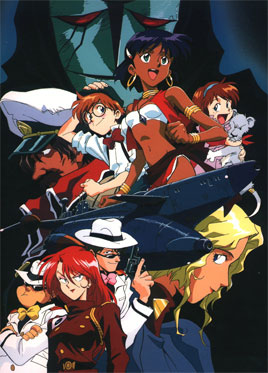Nadia: The Secret of Blue Water
| Nadia : The Secret of Blue Water | |
|---|---|

| |
| Original Manga | None |
| Director/Artist | Hideaki Anno |
| Format | Anime (TV) |
| Made By | Gainax |
| Episode Length | 24 Minutes |
| # of Episodes | 39 |
Contents
Genre
Sum it up in a Sentence:
Nadia and her new friend Jean team up with Captain Nemo and the Nautilus to battle the Neo Atlanteans, who are lead by the evil Gargoyle, in an adventurous romp "Around the World, Under the Sea".
Main Description
Set at the end of the 19th century, Nadia is a story about a young girl involved in a chase around the world with a motley crew with hidden secrets. The concept sounds like something from Miyazaki because it was his idea, originally. However, the idea was shelved and Miyazaki left TOHO. The idea was later pitched to Gainax, and handled by most of the creative team that would later work on Neon Genesis Evangelion (Anno, Sadamoto, Masuo, Maeda, Sagisu, etc..).
The adventures themselves take place among the settings of the Nautilus fighting against the forces of Neo Atlantis, a cultish group bent on the domination of international trade and the world. There are many tight spots, submarine fights, bits of mysterious mythology, secrets, and twists along the way. Many of the story elements that would later be used in Evangelion are present in Nadia, but the show itself is not dominated by the artistic vision of Anno.
The Korean Episodes
13 episodes in the middle of the series were farmed out to cheaper animation in Korea, leading to an overall drop in the quality for those episodes (22-34). The episodes themselves are very light on story exposition, instead being mostly filler surrounding Nadia and Jean. Some recommend watching only 22 and 34 of these episodes, and skipping the rest.
If You Liked This, You Might Like...
Personal Opinions
araeris
I enjoyed this series, even if it does not place among my favorites. The story continues at a reasonable pace for the duration, it has a fair amount of mysteriousness that makes it interesting, and it explains most of the mysteries at the end. It is an interesting contrast for anyone who enjoyed Evangelion, many of the story elements are the same, but is much easier to watch and is not as dominated by the "artistic vision" of the creator.
Zorak
It was -ok-, but I didn't find it fantastic. It had a lot of major effects on shows that followed it (Eureka Seven and Evangelion), but there's so much that those two series do right that this one does absolutely wrong. It suffered from network fuckery in the middle, but that can't excuse the mediocrity of the overall themes and how they're executed in the work. Meh.